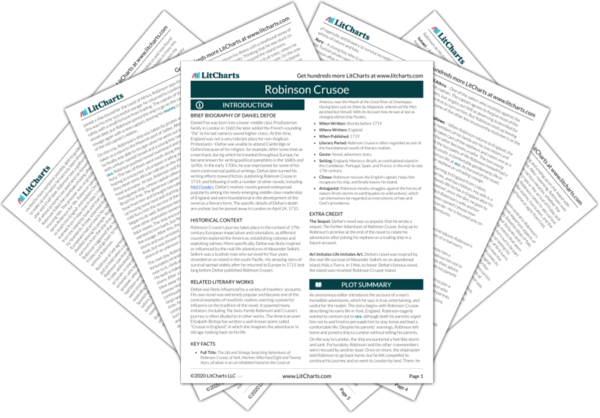Summary
Analysis
When Robinson returned to England, he felt like "as perfect a stranger to all the world as if I had never been known there." He found the widow with whom he had left his money, and promised to help her when he had recovered his fortune from the Brazil plantation. He went home, but found that his parents were both dead and his only family members left were two sisters and two nephews. The English captain who Robinson had rescued gave him a reward of nearly 200 pounds.
Robinson's parents and most of his family have died, leaving Robinson alone in one sense, even as he returns to civilization. Robinson's life of isolation on the island has rendered European society strange to him.
Themes
Quiz
Test Yourself
Robinson decided to go to Lisbon with Friday to learn what had happened with his land in Brazil. There, he found the old Portuguese captain who had rescued him so long ago, who informed him that his plantation was doing well, but in his absence its profits were being divided between the king and the church. Because it was not certain if Robinson was dead or not, the captain had been unable to take control of Robinson's fortune, even though he was his rightful heir.
In a twist of fate, Robinson's plantation did not enter into the control of his heir, the Portuguese captain, whom he is fortunately able to find in Lisbon after so many years. That Robinson existed in this strange place between life and death suggests that his time on the island was a kind of Purgatory, which is interesting as Purgatory is a place where souls go to serve penance before being allowed to enter heaven. In similar fashion, the island served as a place for Robinson to realize the error of his godless early days and to come to Christianity and save his soul.
Themes
Quiz
Test Yourself
The Portuguese captain promised that Robinson would get his rightful fortune back, and Robinson thought of going over to Brazil to reclaim his plantation. Instead, the captain suggested that Robinson send an official letter on a merchant ship to Brazil to have his money sent back to Lisbon. Robinson did this and in seven months received all sorts of wealth (in money, sugar, tobacco, and gold), as well as letters from his former partners in the plantation business.
Now that Robinson is no longer living in isolation, he has desire for wealth beyond simply what he needs to survive. On the island, his fortune would have been useless.
Themes
Quiz
Test Yourself
Robinson was so overcome with emotion at this sudden influx of wealth that he became ill and says that he would have died if it weren't for the care of a doctor. The first thing he did was to repay the Portuguese captain for his kindness and generosity, saying that it was because of him, as well as "the providence of Heaven," that he had come into such a fortune.
In contrast to when he was first rescued by the Portuguese captain, Robinson now sees him as an instrument of providence, showing how fully he has adopted a Christian outlook on the world.
Themes
Quiz
Test Yourself
Get the entire Robinson Crusoe LitChart as a printable PDF.

Robinson says that he had "more care upon my head now than I had in my silent state of life in the island," as he didn't know where to keep his money safely. He wanted to go back to Brazil, but was also reluctant to live in a Catholic country. Moreover, he needed to take care of his property in Europe. So, he decided to journey back to England. First, though, he arranged for the captain's widow back in England to be given a substantial amount of money.
All of Robinson's money brings with it worries and cares that he didn't have while he was living simply on the island. While Robinson is happy to have been rescued from the island, it is not clear that society is completely better than his isolated life.
Themes
Quiz
Test Yourself
Robinson says that he had a "strange aversion" to traveling to England by boat, and tells his reader not to "slight the strong impulses of his own thoughts in cases of such moment." He planned to take a long journey through Paris, by land, and then to take a very short voyage across to England. He was joined by several English merchants and several Portuguese merchants, and the group set out.
Robinson again uses his own experiences to give the reader advice. Even though he is now set for a comfortable, wealthy life, Robinson plans another adventurous journey.
Themes
Quiz
Test Yourself
The group had trouble crossing the snow-covered Pyrenees, and Friday was terrified by the cold weather, which he had never experienced before. Fortunately, the group found a guide who led them on a safe route through the mountains.
Robinson and Friday confront another unknown wilderness, this time quite different from the island. Friday is fearful of the strange, new climate.
Themes
Quiz
Test Yourself












